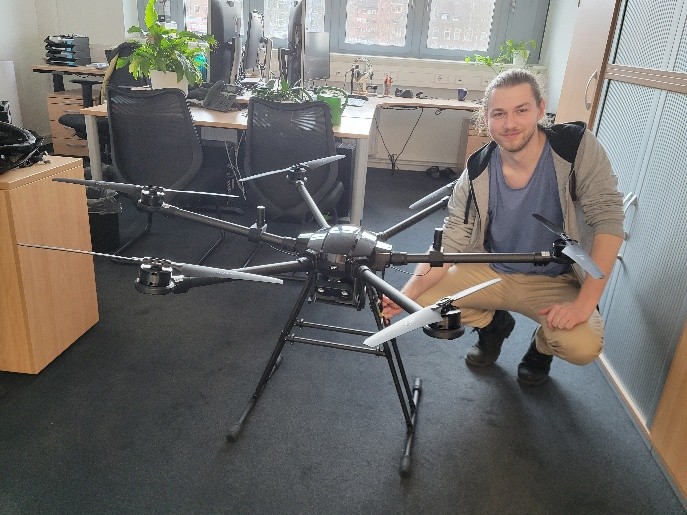Lab "Real-time Signal Processing"
| Basic Information | |
|---|---|
| Lecturers: | Gerhard Schmidt and Moritz Boueke |
| Room: | KS2/Geb.G - PC-Labor |
| Language: | English |
| Target group: | Students in electrical engineering and computer engineering |
| Prerequisites: | Skills in C programming language (DSS part), basic MATLAB/Python knowledge (NT part), diverse coding skills (ICT part) |
| Registration procedure: |
If you want to sign up for this laboratory, you need to register with the following information in the form
Please note, that the registration period starts the 12.03.2025 at 08:00 and ends the 07.04.2025 at 11:59. All applications before and after this registration period will not be taken into account. Registration will be possible within the before mentioned time by sending an e-mail with the information above to The registration is binding. A deregistration is possible by sending an e-mail with your name and matriculation number to Requirements, rules and commitments will be announced at the preliminary meeting (attendance is mandatory). Attendance at all of the final presentations on the 08.07.2025 at 08:15 is mandatory as well to pass the lab. |
| Time: |
Preliminary meeting: 15.04.2025 at 08:15, in presence, room: KS2/Geb.G - PC-Labor Final presentations: 08.07.2025 at 08:15, in presence, room: KS2/Geb.G - PC-Labor |
| Contents: | See the detailed introduction of the topics below. |
Topics
ICT.1: Talkative Power Conversion for Smart Grid Communications (1 group of 3 students, Prof. Dr.-Ing. P.A. Hoeher)
Power electronics and communications engineering are commonly considered as two separate fields. Talkative Power Conversion (TPC) is a novel approach that focuses on data encoding during the process of power conversion. Strictly speaking this means that the usually periodic PWM signal of which its dutycycle is depending on the desired output voltage is replaced by an also data dependent switching signal.
In this lab, a simple setup made of microcrontrollers at transmitter and receiver side are used as real-time processors for modulation and demodulation. A demonstration and explanation of a state-of-proof of the TPC principle is the goal. C/C++ for Arduino programming are required.
Further contact: M.Sc. Maximilian Mewis, ICT,
ICT.2: Visible Light Positioning (VLP) (1 group of 3 students, Prof. Dr.-Ing. P.A. Hoeher)
VLP is an emerging indoor localization technique that utilizes visible light signals from LED sources to determine the position of a receiver. Unlike GPS, which struggles indoors, VLP provides high accuracy by leveraging different properties of light signals detected by a photodiode or camera sensor.
In this lab, a VLP system will be simulated in MATLAB. Through this process, optical signal propagation, path loss models, and localization algorithms in real-time indoor positioning will be explored. Programming skills in MATLAB are required.
Further contact: M.Sc. Hannes Dreier, ICT,
NT: Time Series Prediction using Machine Learning (1 group of 3 students, Prof. Dr.-Ing. S. Pachnicke)
One of the most critical points for autonomous vehicles is the handover process from one base station to another, since the vulnerability to additional latencies and even total connection loss is increased during this process. Hence, accurate handover prediction is an important step to ensuring a fast, stable connection and avoiding accidents.
In this project, multiple time-series forecasting models are to be implemented in Python and their capabilities predict handovers on provided datasets are to be evaluated and compared.
Further contact: M.Sc. Alexandr Langolf, NT,
DSS.1-3: Real-time Audio Processing (3 groups of 3 students, Prof. Dr.-Ing. G. Schmidt)
In this project, students are going to implement a speech enhancement system in the Kiel Real-Time Audio Toolkit (KiRAT). Algorithms within this framework are to be programmed in C language, the graphical user interface is written in C++ using the Qt framework. Thus, it is expected that the participants have some programming skills in C/C++. There will be up to three groups of three students that will create their own speech enhancement systems. Each group will specialize on one of the following algorithmic components:
- Analysis and synthesis filter banks,
- Noise estimation and
- Noise reduction.
Further contact: M.Sc. Moritz Boueke, DSS,
Schedule of Talks
Attendance during all presentations as well as active paticipation in the discussions is mandatory to pass the lab.
The schedule can be found below:
| 08.07.2025 | Group | Topic | Talk duration |
|---|---|---|---|
| 08:15 | Moritz Boueke | Opening | 5 minutes |
| 08:20 | DSS.1 | Real-time Audio Processing - Filter Banks | 30 + 5 minutes |
| 09:00 | ICT.1 | Talkative Power Conversion for Smart Grid Communications | 20 + 5 minutes |
| 09:30 | DSS.2 | Real-time Audio Processing - Noise Estimation | 10 + 5 minutes |
| 09:50 | NT | Time Series Prediction using Machine Learning | 30 + 5 minutes |

 We were happy to welcome Sören Lange as a new member of our team at the beginning of the year. In his master’s thesis, he focused on signal processing for innovative underwater opto-acoustic sensor systems and has since then taken on new challenges in the field of magnetic sensors. His research interests span a wide range of topics, including signal processing and control engineering. With his friendly attitude, technical curiosity and expertise, Sören is a great addition to our team. We look forward to working with him!
We were happy to welcome Sören Lange as a new member of our team at the beginning of the year. In his master’s thesis, he focused on signal processing for innovative underwater opto-acoustic sensor systems and has since then taken on new challenges in the field of magnetic sensors. His research interests span a wide range of topics, including signal processing and control engineering. With his friendly attitude, technical curiosity and expertise, Sören is a great addition to our team. We look forward to working with him!